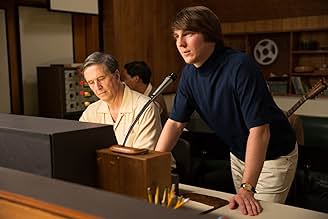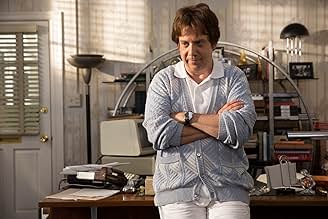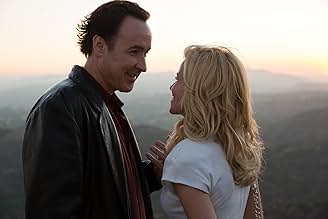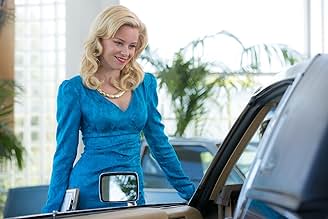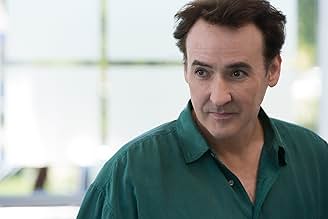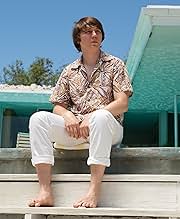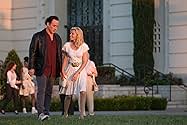Negli anni '60, il leader dei Beach Boys Brian Wilson lotta con la psicosi mentre tenta di realizzare il suo capolavoro pop.Negli anni '60, il leader dei Beach Boys Brian Wilson lotta con la psicosi mentre tenta di realizzare il suo capolavoro pop.Negli anni '60, il leader dei Beach Boys Brian Wilson lotta con la psicosi mentre tenta di realizzare il suo capolavoro pop.
- Regia
- Sceneggiatura
- Star
- Premi
- 20 vittorie e 58 candidature totali
Recensioni in evidenza
10zadkine
I had no idea what this film was about. I thought it would be another musical biopic like "Walk the Line" or "Ray". It's nothing like those movies. This is the most intense, in-depth, and soulful look at the fragility of the creative mind since "All That Jazz". "All That Jazz" is the best film ever made about choreography and dance, this is the best film ever made about rock 'n roll. Dark, often depressing, but also exhilarating, "Love & Mercy", like "All That Jazz", captures the sense of loneliness and despair many creative geniuses suffer. And when the music starts, it's cool, loud, and breathtaking. "A Beautiful Mind" is the best film ever made about mental illness, because it's an unflinching and compassionate portrait rendered with remarkable artistic skill by director Ron Howard and acted by Russell Crowe. "Love & Mercy" is its equal: Director Bill Pohlad tells an equally moving story of a man's mind falling apart, every bit as skillfully as Ron Howard, and the performances by Paul Dano and John Cusack are each Oscar worthy - as was Russell Crowe's. And first and foremost, I found it to be one of the most painful and frightening portrayals of a tyrannical father ever put on film. Brian Wilson was surrounded by monsters, real and imaginary. In many ways the Beach Boys were a performing family, like the Osmonds or the Jackson 5, a band of brothers at the mercy of a brutal father. I could go on and on,there's a lot going on here - it's a terrific love story too - this movie delivers on so many levels.
Personal genius has been brilliantly portrayed in film before: "A Beautiful Mind" for maths; "Amadeus" for classical music; and more recently "A Theory of Everything" for cosmology. Behind such genius is often a degree of dysfunction, if not borderline madness.
Here with "Love and Mercy" we get an insight into the creative churning of Wilson's tortured mind. But it is very much a time-banded view, focused on two key periods of his life: 1966, with Paul Dano ("12 Years a Slave"; "Looper") playing Wilson, and the 1990's where Wilson – severely drug-damaged, mentally ill and now played by John Cusack - is being taken for a ride by an unscrupulous and dangerous psychiatrist, Dr Eugene Landy (Paul Giamatti). Playing a key role in his recovery is car saleswoman Melinda Ledbetter (Elizabeth Banks) who Wilson desperately latches onto as a drowning man might grab a life-vest.
Whilst the film could be described as a game of two halves, this is not how it is played out. We jump between both eras without warning, which works extremely well in maintaining the interest in the two parallel stories.
In biopic terms, the 60's segments are probably the more gripping, providing a riveting insight into the production techniques of the iconic "Pet Sounds" album, frequently cited as one of the most innovative and creative albums ever released. The film also features superbly recreated 'old footage' (cinematography by Robert D. Yeoman) showing Beach Boy TV slots and video productions. Wilson's genius is neatly reflected through the admiration of the session musicians: they'd "played with them all" – Sinatra, Presley, Sam Cooke, etc – but Wilson was something else entirely.
Paul Dano is just superb as the troubled youngster, physically and mentally abused by his father (an excellent Bill Camp) and exhibiting mental instability even before the dangers of LSD become evident. His slide into near insanity is brilliantly reflected in an audio soundscape that merges snatched Beach Boy fragments and natural sounds into a cacophony. If Edward Tize and his sound department doesn't get nominated for an Oscar for Best Sound Mixing there is no justice in the world.
In the 90's segments, Cusack delivers his best performance in years as the older Wilson. And after being rude about Elizabeth Banks' directing skills for "Pitch Perfect 2", I feel I have to express my admiration for her portrayal of perplexed astonishment as Melinda, a woman with a mission. Both extremely subtle and utterly enjoyable performances.
In contrast, the excellent Giamatti seems rather over the top as the scheming Landy, although internet articles suggest that it is a scarily accurate portrayal of the degree of control he exerted.
Directed by Bill Pohlad (someone normally found in the production office), it's difficult to fault such a lovingly crafted film. The pre-credits reference to a 'building scream' (I assume relating to the 'goose-bumpy' bit of "Good Vibrations") is never resolved. And (as I rather missed it in the film) the motives for Landy's extreme actions are a bit obscure (in reality, the Wilson family later discovered he was named as a 70% beneficiary in Wilson's will). However, this film, which deserved a broader and better-publicised release, stands as a superb tribute to an iconic musician and comes with a "highly recommended" from me.
(If you enjoyed this review, please see the illustrated version at bob-the-movie-man.com and enter your email address to receive future reviews. Thanks).
Here with "Love and Mercy" we get an insight into the creative churning of Wilson's tortured mind. But it is very much a time-banded view, focused on two key periods of his life: 1966, with Paul Dano ("12 Years a Slave"; "Looper") playing Wilson, and the 1990's where Wilson – severely drug-damaged, mentally ill and now played by John Cusack - is being taken for a ride by an unscrupulous and dangerous psychiatrist, Dr Eugene Landy (Paul Giamatti). Playing a key role in his recovery is car saleswoman Melinda Ledbetter (Elizabeth Banks) who Wilson desperately latches onto as a drowning man might grab a life-vest.
Whilst the film could be described as a game of two halves, this is not how it is played out. We jump between both eras without warning, which works extremely well in maintaining the interest in the two parallel stories.
In biopic terms, the 60's segments are probably the more gripping, providing a riveting insight into the production techniques of the iconic "Pet Sounds" album, frequently cited as one of the most innovative and creative albums ever released. The film also features superbly recreated 'old footage' (cinematography by Robert D. Yeoman) showing Beach Boy TV slots and video productions. Wilson's genius is neatly reflected through the admiration of the session musicians: they'd "played with them all" – Sinatra, Presley, Sam Cooke, etc – but Wilson was something else entirely.
Paul Dano is just superb as the troubled youngster, physically and mentally abused by his father (an excellent Bill Camp) and exhibiting mental instability even before the dangers of LSD become evident. His slide into near insanity is brilliantly reflected in an audio soundscape that merges snatched Beach Boy fragments and natural sounds into a cacophony. If Edward Tize and his sound department doesn't get nominated for an Oscar for Best Sound Mixing there is no justice in the world.
In the 90's segments, Cusack delivers his best performance in years as the older Wilson. And after being rude about Elizabeth Banks' directing skills for "Pitch Perfect 2", I feel I have to express my admiration for her portrayal of perplexed astonishment as Melinda, a woman with a mission. Both extremely subtle and utterly enjoyable performances.
In contrast, the excellent Giamatti seems rather over the top as the scheming Landy, although internet articles suggest that it is a scarily accurate portrayal of the degree of control he exerted.
Directed by Bill Pohlad (someone normally found in the production office), it's difficult to fault such a lovingly crafted film. The pre-credits reference to a 'building scream' (I assume relating to the 'goose-bumpy' bit of "Good Vibrations") is never resolved. And (as I rather missed it in the film) the motives for Landy's extreme actions are a bit obscure (in reality, the Wilson family later discovered he was named as a 70% beneficiary in Wilson's will). However, this film, which deserved a broader and better-publicised release, stands as a superb tribute to an iconic musician and comes with a "highly recommended" from me.
(If you enjoyed this review, please see the illustrated version at bob-the-movie-man.com and enter your email address to receive future reviews. Thanks).
While I generally enjoy most music biopics, it's hard to argue with the fact that most of them tend to subscribe to a very familiar pattern. Every once in awhile, a film comes along that break the mold - Todd Haynes did it in 2007 with I'm Not There, which featured six different actors portraying Bob Dylan at various points in his career. That film's writer, Oren Moverman, offers a similarly unconventional approach to Love & Mercy, which hones in on two critical periods during the life of Beach Boys songwriter Brian Wilson.
We first encounter Brian (Paul Dano) during the 1960s, shortly before the band is scheduled to head out for a tour of Japan. Reluctant to return to the road, Brian convinces his brothers that he belongs at home in the studio, where he'll be more effective at creating the band's next album. The boys finally acquiesce, and Brian hires a collection of studio musicians to begin crafting what would ultimately become Pet Sounds.
Our next encounter with Brian comes during the 1980s, where he's portrayed by John Cusack. Brian meets, and attempts to court, Cadillac saleswoman Melinda Ledbetter (Elizabeth Banks), but she quickly discovers that Brian's life is not his own when she meets Dr. Eugene Landy (Paul Giamatti), his therapist and legal guardian. Landy controls every aspect of Brian's existence, from his diet to his personal relationships, all the while insisting that he has Brian's best interests at heart.
The film frequently cuts between these two periods in Brian's life. We see the depths of his imagination and creativity as he employs a range of nontraditional elements to record Pet Sounds, desperately trying to bring to life the music he hears in his head, and all the while sliding further and further into the grip of severe mental illness. And we see the results of that illness, as Brian becomes a timid, broken man, cut off from his friends and family, allowing himself to be controlled and manipulated, and never able to find peace.
Director Bill Pohlad does a marvelous job of illustrating the parallels between each on screen version of Brian Wilson, and both actors give brilliant, emotional performances. Dano in particular turns in what can arguably be called the best work of his career, perfectly embodying Brian's childlike glee as he excitedly flits around the studio, and capturing the anguish and desperation as his mind continues to deteriorate.
Unorthodox in its approach and admirable in its complexity, Love & Mercy wisely chooses not to paint a definitive portrait of a man whose life couldn't possibly be summed up in a two-hour film. By confining the narrative to these two specific chapters, we're able to go far beyond the surface and reveal the inner workings of a tortured genius, and shed light on a story that few people are familiar with. Love & Mercy is a truly exceptional film about the internal and external struggles of a truly exceptional person, and is one of the most emotionally resonant experiences I've had with a film this year.
We first encounter Brian (Paul Dano) during the 1960s, shortly before the band is scheduled to head out for a tour of Japan. Reluctant to return to the road, Brian convinces his brothers that he belongs at home in the studio, where he'll be more effective at creating the band's next album. The boys finally acquiesce, and Brian hires a collection of studio musicians to begin crafting what would ultimately become Pet Sounds.
Our next encounter with Brian comes during the 1980s, where he's portrayed by John Cusack. Brian meets, and attempts to court, Cadillac saleswoman Melinda Ledbetter (Elizabeth Banks), but she quickly discovers that Brian's life is not his own when she meets Dr. Eugene Landy (Paul Giamatti), his therapist and legal guardian. Landy controls every aspect of Brian's existence, from his diet to his personal relationships, all the while insisting that he has Brian's best interests at heart.
The film frequently cuts between these two periods in Brian's life. We see the depths of his imagination and creativity as he employs a range of nontraditional elements to record Pet Sounds, desperately trying to bring to life the music he hears in his head, and all the while sliding further and further into the grip of severe mental illness. And we see the results of that illness, as Brian becomes a timid, broken man, cut off from his friends and family, allowing himself to be controlled and manipulated, and never able to find peace.
Director Bill Pohlad does a marvelous job of illustrating the parallels between each on screen version of Brian Wilson, and both actors give brilliant, emotional performances. Dano in particular turns in what can arguably be called the best work of his career, perfectly embodying Brian's childlike glee as he excitedly flits around the studio, and capturing the anguish and desperation as his mind continues to deteriorate.
Unorthodox in its approach and admirable in its complexity, Love & Mercy wisely chooses not to paint a definitive portrait of a man whose life couldn't possibly be summed up in a two-hour film. By confining the narrative to these two specific chapters, we're able to go far beyond the surface and reveal the inner workings of a tortured genius, and shed light on a story that few people are familiar with. Love & Mercy is a truly exceptional film about the internal and external struggles of a truly exceptional person, and is one of the most emotionally resonant experiences I've had with a film this year.
Brian Wilson's story is worthy of a movie. Neither his creative genius or his mental illness were appreciated until years after the fact. His childhood, as was Michael Jackson's 15 years later , shaped the adult life he inherited. His creative genius allowed and encouraged him to be used by others, including the other "Beach Boys". Mike Love is finally exposed in this film. The story is very interesting. The casting very good, the acting excellent. John Cusack hasn't been this good
maybe never. Elizabeth Banks will be a feature actor after this film. Dano did a very good job. Giamarti might have been a little over the top but to someone who appreciates the Beach Boys and music in general, the scenes from the recording studio are priceless. My fault finding with this movie are the direction and editing. Too long, too dry in spots. A better director would have won an Academy Award with this story
Greetings again from the darkness. Beach Boys fans may struggle a bit with this one since the light-hearted, airy feel to the "Fun, Fun, Fun" music of the band is mostly absent. Instead, director Bill Pohlad pulls back the curtain on the emotional and mental struggles of visionary songwriter Brian Wilson
the band's creative force.
In an unusual artistic approach, Paul Dano plays Brian from the 1960's period that resulted in the revolutionary Pet Sounds album and the ongoing battle with his domineering father; while John Cusack plays Brian from the late 1980's - his most creatively bankrupt period and the subsequent debilitating influence of quackster psychologist Dr. Eugene Landy (Paul Giamatti).
The two periods are blended together as we (and Brian) bounce back and forth between the struggle of a budding musical genius working to release the sounds in his head, and a middle aged man so heavily medicated that speaking, eating and even getting out of bed are such overwhelming obstacles that music rarely registers. It's during the latter period that Brian is truly at the mercy of Dr. Eugene Landy. Giamatti sports a floppy wig and proceeds to rage at Brian while trying to charm Melinda (Elizabeth Banks), Brian's new romantic interest. Knowing this disgusting period was part of Brian's life only adds to the anger and frustration we feel not just as fans, but as human beings.
What sets this biopic apart is actually the performance of Dano and the peek inside the process of Brian's genius. Watching Brian work the musicians and mold the music on the fly is breath-taking, even though we see the challenges of his early mental issues. It's a joy to see a tribute to the studio session players known as "The Wrecking Crew" themselves the subject of a recent stellar documentary. It's during this period that the Wilson brothers' father (played by Bill Camp) constantly derides Brian and his "new" music. There is also some insight into the Brian vs Mike Love battles – Brian exploring his creative music, while Mike just wants to keep cashing in with their expected "fun" style.
Some may find the two-headed approach to be distracting, but it drives home the point of what a different man he was in comparing the mid-1960's to the late 1980's. Mostly, I found the 1960's portion to be an insight into what we hear from so many geniuses, regardless of their specialty. Brian says it's like "Someone is inside me. Not me." His struggles are non-relatable to others – even his brothers, and especially his dad. What is mostly a look at the darkness behind the "sunny" music, does come with real life redemption courtesy of Melinda's strength and witnessed in the video shown over the closing credits.
In an unusual artistic approach, Paul Dano plays Brian from the 1960's period that resulted in the revolutionary Pet Sounds album and the ongoing battle with his domineering father; while John Cusack plays Brian from the late 1980's - his most creatively bankrupt period and the subsequent debilitating influence of quackster psychologist Dr. Eugene Landy (Paul Giamatti).
The two periods are blended together as we (and Brian) bounce back and forth between the struggle of a budding musical genius working to release the sounds in his head, and a middle aged man so heavily medicated that speaking, eating and even getting out of bed are such overwhelming obstacles that music rarely registers. It's during the latter period that Brian is truly at the mercy of Dr. Eugene Landy. Giamatti sports a floppy wig and proceeds to rage at Brian while trying to charm Melinda (Elizabeth Banks), Brian's new romantic interest. Knowing this disgusting period was part of Brian's life only adds to the anger and frustration we feel not just as fans, but as human beings.
What sets this biopic apart is actually the performance of Dano and the peek inside the process of Brian's genius. Watching Brian work the musicians and mold the music on the fly is breath-taking, even though we see the challenges of his early mental issues. It's a joy to see a tribute to the studio session players known as "The Wrecking Crew" themselves the subject of a recent stellar documentary. It's during this period that the Wilson brothers' father (played by Bill Camp) constantly derides Brian and his "new" music. There is also some insight into the Brian vs Mike Love battles – Brian exploring his creative music, while Mike just wants to keep cashing in with their expected "fun" style.
Some may find the two-headed approach to be distracting, but it drives home the point of what a different man he was in comparing the mid-1960's to the late 1980's. Mostly, I found the 1960's portion to be an insight into what we hear from so many geniuses, regardless of their specialty. Brian says it's like "Someone is inside me. Not me." His struggles are non-relatable to others – even his brothers, and especially his dad. What is mostly a look at the darkness behind the "sunny" music, does come with real life redemption courtesy of Melinda's strength and witnessed in the video shown over the closing credits.
Lo sapevi?
- QuizThe real Wilson reported having a mild dissociative experience while watching the film. He started to believe that Paul Giamatti was the actual Eugene Landy and felt "absolutely in fear" for several minutes.
- BlooperContrary to what is shown, the recording for "Good Vibrations" began during the making of "Pet Sounds", not after.
- Citazioni
Brian Future: I want you to leave, but I don't want you to leave me.
- Curiosità sui creditiFirst, there's concert footage of the recent Brian Wilson, himself, singing "Love & Mercy", and then at the very end there is audio of a brief recreated studio recording of Good Vibrations, with '60s Brian leading the dialogue.
- Versioni alternativeThe version which premiered at the 2014 Toronto Film Festival and a few subsequent public screenings contained a few extra scenes, such as an "I Get Around" studio sequence, and a scene where Wilson meets Phil Spector on the street. The closing song "One Kind of Love" was also absent from this cut.
- Colonne sonoreSurfin' U.S.A.
Written by Chuck Berry
Lyrics by Brian Wilson (uncredited)
Performed by The Beach Boys
Courtesy of Capitol Records
Under license from Universal Music Enterprises
I più visti
Accedi per valutare e creare un elenco di titoli salvati per ottenere consigli personalizzati
- How long is Love & Mercy?Powered by Alexa
- Why cast two actors for the same role?
Dettagli
- Data di uscita
- Paese di origine
- Siti ufficiali
- Lingua
- Celebre anche come
- Tutto per la musica - Brian Wilson & The Beach Boys
- Luoghi delle riprese
- Aziende produttrici
- Vedi altri crediti dell’azienda su IMDbPro
Botteghino
- Budget
- 10.000.000 USD (previsto)
- Lordo Stati Uniti e Canada
- 12.551.031 USD
- Fine settimana di apertura Stati Uniti e Canada
- 2.122.177 USD
- 7 giu 2015
- Lordo in tutto il mondo
- 28.641.776 USD
- Tempo di esecuzione2 ore 1 minuto
- Colore
- Mix di suoni
- Proporzioni
- 1.85 : 1
Contribuisci a questa pagina
Suggerisci una modifica o aggiungi i contenuti mancanti

Divario superiore
By what name was Love and Mercy (2014) officially released in India in English?
Rispondi






